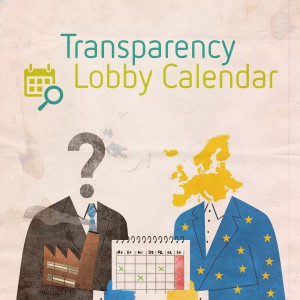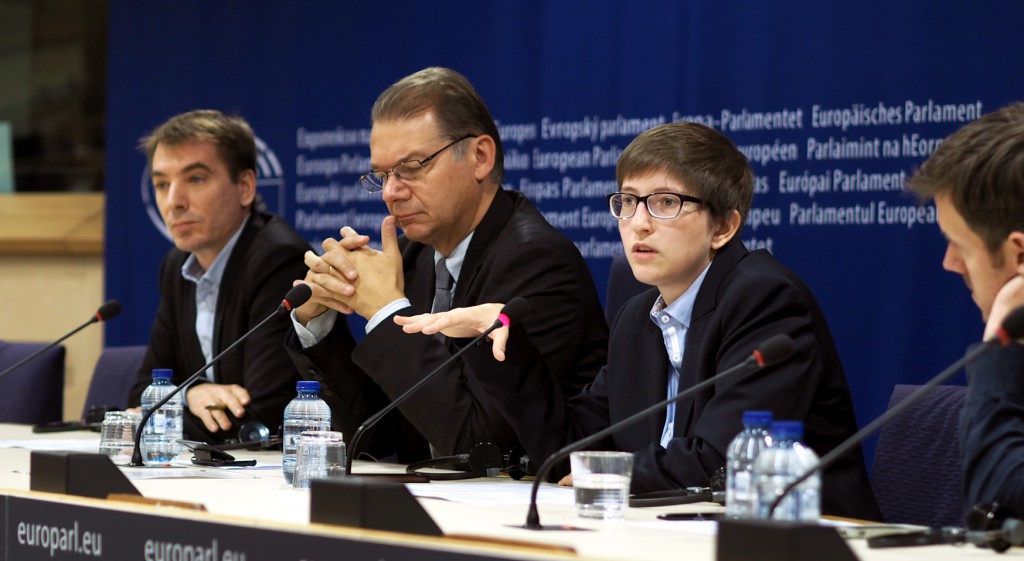
Today, I am publishing all meetings I took with lobbyists and interest groups this year. From now on, all future meetings will be published as they happen as open data.
Several of my Greens/EFA group colleagues are doing likewise, using an open source tool that was developed on my initiative to better fulfil our obligations to be transparent and accountable to all Europeans.
The twin challenges of balance and transparency
As soon as I was named rapporteur for the copyright report, requests from lobbyists started pouring in. It looked like suddenly everyone wanted to meet.
But was it really everyone? If I were to only react to incoming requests, accepting some and rejecting others, would I really be getting a balanced view of the opinions of those who would be affected by copyright legislation – or would industry lobbies with the biggest budgets speak loudest, drowning out voices from civil society? Who did I need to reach out to on my own, since they didn’t have the resources or awareness to do so themselves?
Also: Which way of publishing the data would best allow public scrutiny and input? How could I lift the veil on the process behind my parliamentary work in an optimal way?
I started categorising incoming requests by organisation type and tracking the meetings I took in a spreadsheet which I later published. It was a lot of effort to keep this data up-to-date, but it paid off: It made it much easier to balance out the surplus of meeting requests from publishers and service providers and identify groups that I needed to proactively reach out to, like authors and academics.
But there had to be a better way.
Let’s make it better …with computers!
Being hackers, my office staff looked into ways of automating this process. It was obvious to us: Every single step that required manual effort would mean that our transparency would be less real-time, less accurate and be seen as more of a burden internally. We needed to extract the meeting data at its source: My calendar.
The European Parliament runs a fairly locked down Microsoft-based IT environment. Mab, a Swedish Pirate who used to assist my predecessor Amelia Andersdotter and now works for the group, gives new recruits pragmatic advice that can be hard to swallow for staunch supporters of open source: “Learn to live in Outlook, fighting it only makes it worse”. With us unable to install unapproved software on our own work computers, getting at the data wasn’t going to be easy.
But there’s one action you can take on events in Outlook to bridge the gap: You can invite an external email address to participate in meetings. A few days later, we had put together a proof of concept: By inviting a “robot attendee” to a meeting (just a piece of software with an email address), we are able to extract the event data and republish it with almost zero extra effort. LobbyCal was born.
Now follow our lead
 Watch the press conference announcing LobbyCal
Watch the press conference announcing LobbyCalI was very happy to see the Greens/EFA group adopt Transparency & Democracy – two of my top priorities – among their core issues for this legislative period. Elevating the project to the group level allowed us to contract out the development to turn a proof of concept into a flexible and powerful tool. Today, LobbyCal is compatible with most types of calendar software (like Outlook, Google Calendar and Zimbra) and integrates seamlessly into several website content management systems.
And now we’re hoping to grow it even further. I am elated that the renowned transparency NGO Transparency International has agreed to take over management of the code (on Github here, here and here) to turn it into a non-partisan project and encourage MEPs from other groups and officials at other levels to use it. Obviously it’s open source code, dedicated to the public domain with the CC-0 license. Contributions and forks welcome!
Of course, providing raw data is only the first step. I don’t expect many voters to manually scrutinise their MEP’s meetings. The tool publishes all data in a machine-readable open format to enable the general public or NGOs to analyse it, find patterns and draw conclusions (the API documentation is still work in progress). Ultimately, this data will be most useful attached not to individual MEPs, but to pieces of legislation: Each law should come with a comprehensive “legislative footprint” allowing you to investigate the influences behind it.
So what can transparency uncover? Egregious imbalances like this one: Günther Oettinger is the Commissioner who meets the second-most lobbyists – and 93% of them represent corporations. “During his first year in office he has only met six NGOs. Deutsche Telekom alone had almost the same amount of meetings as all of civil society combined”, TI has analysed.
I assure you that I will lend more of an ear to civil society.
You can take my data for it.
To the extent possible under law, the creator has waived all copyright and related or neighboring rights to this work.
Transparenz ist die Voraussetzung für das Wiedererlangen des Vertrauens in die EU
Es gab zu viele Beispiele von einseitigen Begünstigungen ohne Rücksicht auf den Gemeinnutzen. Wenn letzteres im Vordergrung steht wozu dann die Geheimnistuerei?
Ein öffentlicher Pranger-Effekt wird unverschämte Wünsche nicht aufkommen lassen.
Alle Fragen können offen im Internet diskutiert werden. Niemand kann auf die meisten Fragen die absolute Antwort geben. Vielleicht gibt es so etwas wie die “Schwarm-Inteligenz” ? Auch die Fähigkeit zur Selbstorganisation darf nicht unterschätzt werden. Es muss nicht alles genormt und geregelt werden.
Siehe das Einspringen der NGOs bei der Flüchtlings-Problematik.
Alles Gute für Ihre Arbeit.